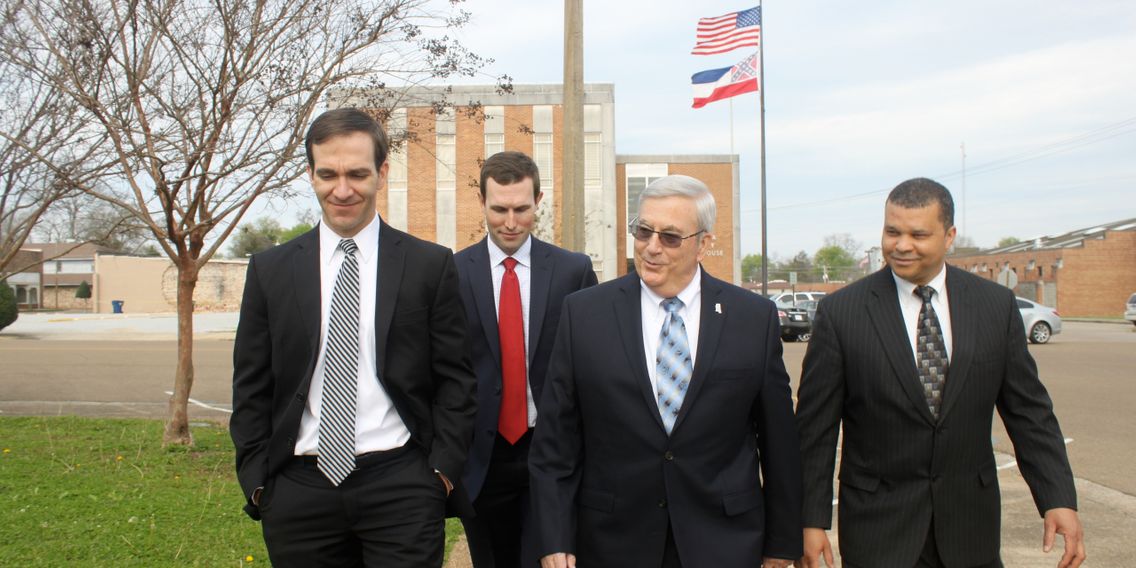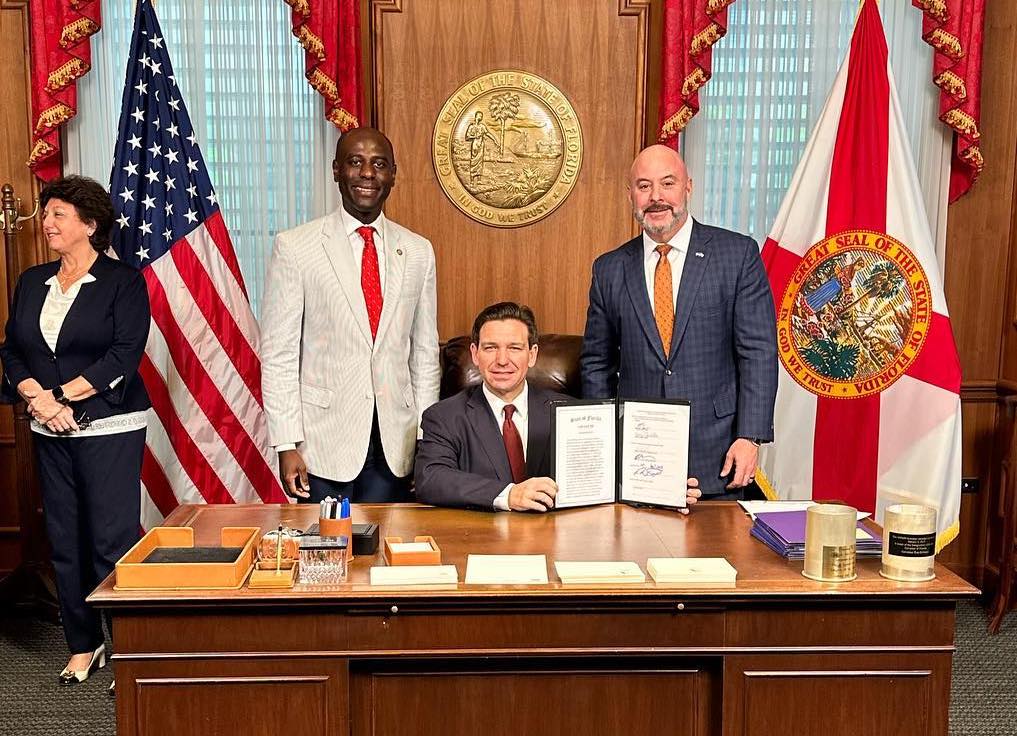Mississippi DA, Exposed for Striking Black Jurors, Leaves His Office On His Own Terms
When the Supreme Court struck down Curtis Flowers’ conviction, it sparked lawsuits, bills, and calls for oversight. But DA Doug Evans is getting to walk away with no accountability.
Parker Yesko | June 30, 2023


Doug Evans, the district attorney best known for his tireless crusade against Curtis Flowers, a Black Mississippian whom Evans tried an extraordinary six times for the same crime, is leaving office today. He was the chief prosecutor of his central Mississippi district for more than 30 years.
Evans captured national attention when, in 2019, he drew an unusually scathing condemnation from the U.S. Supreme Court for engaging in racial discrimination during jury selection at Flowers’ many trials. Flowers was set free after nearly 23 years behind bars and awarded $500,000 by the state of Mississippi for his wrongful imprisonment. Yet Evans faced no consequences.
He continued to run his DA’s office without additional oversight, dodging bar discipline and a civil rights lawsuit, and cruising to re-election unopposed. In an apparent response to the Supreme Court ruling, a lawmaker introduced bills to reform jury selection, but those went nowhere in the legislature. Now Evans exits his office as he ran it, on his own terms, having set the stage for one of his deputies to take up his mantle.
Evans, now 70, submitted his resignation letter to a state agency in late May, but made no public announcement regarding his departure to his constituents. A local judge revealed Evans’ plans in a court filing on Wednesday. Both documents were reviewed by Bolts.
I first came across Evans in 2017 when I began reporting on the Flowers case for In the Dark, a podcast that investigated Flowers’ ordeal at the hands of Evans.
At the time, Flowers was on death row at the Mississippi State Penitentiary in Parchman. He’d been convicted in 2010, at his sixth trial, for the 1996 murders of four people at Tardy Furniture store in a town called Winona. Flowers’ first three trials had resulted in convictions that were later overturned by the Mississippi Supreme Court due to prosecutorial misconduct; his fourth and fifth trials ended in hung juries.
We found that Evans had used unreliable and faulty evidence in his repeated prosecutions of Flowers, and our analysis of Evans’ discriminatory jury selection practices—in the Flowers case and beyond—revealed his troubling legacy as a prosecutor.
Montgomery County, Mississippi, where the Tardy Furniture murders took place, is nearly half Black. And yet, the juries that convicted Flowers never had more than one Black member; two were all white. Though the U.S. Supreme Court had ruled in 1986 that it’s unconstitutional to dismiss people from juries because of their race in a landmark decision known as Batson, Evans seemed to be doing just that.
In Flowers’ second trial, Evans removed a Black juror who he claimed was in a gang and sleeping in the courtroom. Neither claim turned out to be true, and the judge ordered the man back on to the jury, ruling that Evans had violated Batson. In Flowers’ third trial, Evans used all 15 of his discretionary strikes to remove Black people from the jury. When the Mississippi Supreme Court reversed Flowers’ conviction from that trial, the court called Evans’ actions “as strong a prima facie case of racial discrimination as we have ever seen.”
Evans’ behavior in Flowers’ trials was part of a broader pattern at his office. In the Dark’s team spent months collecting trial records—over 115,000 pages of them—deciphering notes scrawled on jury lists, and analyzing transcripts of juror questioning. We found that, over a period of 26 years, Evans and his assistants had struck Black prospective jurors more than four times as often as they struck white ones.
Evans’ alarming history gave the U.S. Supreme Court cause to throw out yet another of Flowers’ convictions in June 2019. The high court condemned Evans’ prosecution in stark terms. “The State’s relentless, determined effort to rid the jury of black individuals strongly suggests that the State wanted to try Flowers before a jury with as few black jurors as possible, and ideally before an all-white jury,” wrote Justice Brett Kavanaugh.
Evans was undaunted. “It was a ridiculous ruling,” he told a local newspaper shortly after the decision. “They basically said there was nothing wrong with the case and reversed it anyway.”
For a brief time that year, it looked as if Evans might face consequences for his misconduct. He’d become an exception to the rule that prosecutors elude scrutiny, with multiple judges saying his practices for selecting juries violated the constitution.
An In the Dark listener had filed a complaint against Evans with the Mississippi Bar Association, which can reprimand, suspend or disbar attorneys who violate professional standards. And four of Evans’ Black constituents filed a lawsuit, alongside a local branch of the NAACP, seeking court-mandated oversight to force Evans to clean up his act. They asked a federal judge to “hold [Evans] accountable for the policy, custom, and usage of racially discriminatory jury selection” and to grant “an injunction to end this odious practice.”
But the lawsuit was thrown out on procedural grounds, and the bar complaint has resulted in no known discipline.
One state lawmaker, Derrick Simmons, authored a bill in 2021 that would have made it easier for defendants like Flowers to stop Evans, or any other prosecutor, in his tracks, if he looked to be discriminating against prospective jurors on the basis of race. But the bill died in a legislative committee. Simmons, a Black Democrat, tried two more times, filing the bill again in the 2022 and 2023 sessions, and twice more it died without ever making it to the floor for a vote.
Progress on this issue has been slow-moving throughout the country, but in recent years, some states have made strides by limiting the ways lawyers can use peremptory challenges, the discretionary strikes that allow them to remove jurors without having to state a cause. Washington and California have both adopted rules aimed at preventing unconscious or implicit bias in their use. California’s 2020 law, for instance, makes it easier to argue that the removal of a prospective juror violates Batson, barring the attorney that asked for the removal from defending it with reasons that are essentially proxies for racial discrimination, like having a relative who’s been stopped by police or having a general distrust of law enforcement.
The Arizona Supreme Court went a step further in 2021, eliminating peremptory strikes altogether. Now jurors in Arizona can be dismissed only when a judge has determined they are unable to serve.
Peter Swann, former chief judge of the Arizona Court of Appeals, filed the petition to Arizona’s Supreme Court that resulted in the change. He says he was inspired to take action after an especially egregious Batson case came before him on the bench. “I usually find that when a tool is being used unfairly, taking it away is often the only way to achieve fairness,” he told me. “It’s very hard to have a view that discrimination will happen in jury selection if you take away peremptories.”
Data collected by the court system in Maricopa County, where more than half of Arizonians live, shows that this change has made juries more diverse. The share of jurors identifying as Hispanic increased by 15 percent in criminal trials between 2019, the last full year before the reform when jury trials were unperturbed by the pandemic, and 2022, the year the change took effect. On civil juries, the share of jurors of color saw an uptick of roughly 15 percent over the same period.
“A successful Arizona experiment, which we now have, is going to add fuel to the fire,” Swann said. “Arizona was the first domino. Eventually they’re going to start falling.”
It seems unlikely that Mississippi will be next.
“Legislators in Mississippi aren’t interested in strengthening Batson,” said Tucker Carrington, who heads the Mississippi Innocence Project and was one of Flowers’ lawyers. “Legislators know that race affects peoples’ lived experiences, and many of them are also lawyers who don’t want to make it harder to control which lived experiences end up on their juries.”
Carrington says eliminating peremptories is a step in the right direction, but he also thinks that Batson needs a more ambitious overhaul in order for juries to truly become fair.
“Doug Evans is an egregious example, but the criminal justice system is full of prosecutors like him. Under the Batson paradigm, nothing much happens to them. They get a slap on the wrist and then it’s back to business as usual,” Carrington said.
Indeed, Evans was allowed to try Flowers again and again, even after he was caught discriminating in Flowers’ trials. Just months after the Supreme Court’s rebuke made him a national figurehead of misconduct, Evans was elected to a sixth term as DA of Mississippi’s Fifth Circuit Court District; no one even ran against him. Last fall, he was bold enough to throw his hat into the ring for a local judgeship. It was there that he finally suffered a setback, losing to a popular local attorney in a runoff.
Not long after, with his job as DA back in play in the 2023 election cycle, Evans let a February filing deadline pass without entering the DA’s race, forgoing a reelection bid.
He then told his staff he would leave office early, on June 30, in the middle of the contest to fill his seat. He sent his resignation letter to the state of Mississippi in May, which I learned through a public records request to the governor’s office. But he made no statement to the public that had kept him in his post for decades. I called Evans to ask about his imminent exit, but he hung up on me once I identified myself and did not respond to a later text message.
Circuit Judge Joey Loper, who presided over two of Flowers’ trials and ordered his release from jail in 2019, on Wednesday appointed Mike Howie, an assistant prosecutor in Evans’ office, to serve as interim DA upon Evans’ departure.
Evans’ long-term successor will also come from within his office. Only two candidates are running to replace him in the upcoming election, and both are his assistant DAs.
The winner will be decided in the Aug. 8 GOP primary in the state’s Fifth District, which covers Attala, Carroll, Choctaw, Grenada, Montgomery, Webster, and Winston counties.
One of the candidates, Adam Hopper, is the long-time staffer who did Evans’ bidding in the final days of the prosecution of Curtis Flowers. It was Hopper who appeared in court in late 2019 to say his office still had a strong case against Flowers and to oppose his release from jail, even after his conviction had been overturned by the U.S. Supreme Court. Hopper didn’t respond to requests for comment.
His opponent, Rosalind Jordan, is one of Evans’ newer assistant DAs. Jordan, a former public defender, told me that “it’s important that you go the extra mile in making sure that you do your jury selection properly, and that you don’t discriminate based on sex or race or anything like that.” But she also said she thought no change was needed at the DA’s office.
“What I’ve witnessed since I’ve been here since 2021, I’ve found to be completely in compliance with our ethical code and the rules of criminal procedure,” Jordan said.
“I would just encourage continuing to follow that.”
On Friday, the same day Evans leaves office, the U.S. Supreme Court declined to hear an appeal by Tony Terrell Clark, a Black man sitting on death row in Mississippi, who alleged that his conviction was marred by Batson violations. (The case was not prosecuted by Evans’ office.) The state Supreme Court rejected Clark’s challenges last year. In response to the U.S. Supreme Court’s refusal to take up the case, Justice Sonia Sotomayor wrote an excoriating dissent warning that Mississippi courts seem to be “[carrying] on with business as usual,” rather than heeding her court’s 2019 decision in Flowers’ favor.
“Because this Court refuses to intervene, a Black man will be put to death in the State of Mississippi based on the decision of a jury that was plausibly selected based on race,” Sotomayor wrote in reference to Clark, joined by Justices Elena Kagan and Ketanji Brown Jackson. “That is a tragedy, and it is exactly the tragedy that Batson and Flowers were supposed to prevent.”
“The result is that Flowers will be toothless in the very State where it appears to be still so needed.”
The article was updated on June 30 with a response from the governor’s office, and with a new order by the U.S. Supreme Court in the case of Tony Terrell Clark.
Sign up and stay up-to-date
Our weekly newsletter on the local politics of criminal justice and voting rights




